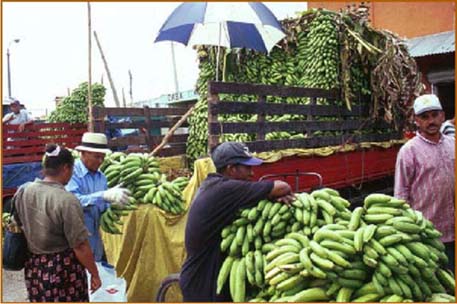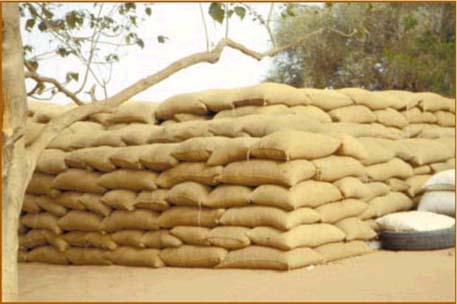


1. Promote supportive attitudes and
policies towards food producers, processors, traders, shopkeepers, street
vendors, transporters and consumers
2. Promote private
investment
3. Intervene in food supply and
distribution
4. Coordinate public interventions and
private initiatives
5. Intermediate between central
government and the private food sector
Your institutions do not usually have a direct role in
national policies (food security, agriculture, public health, etc.). You can,
however, take the lead in improving access to food by low-income urban
households because:
- national policies may not sufficiently respond to local needs and conditions;
- you are in closer contact with the local community than central government
institutions;
- your key functions already include the development, operation and management
of food market and processing infrastructure and regulations, the control
of urban and periurban agriculture, etc.;
- you can develop collaborative partnerships with the private sector to replace,
improve and manage urban food market and processing infrastructure despite
reduced investment budgets;
- you are being assigned greater responsibilities by the central government.
Your institutions can play five major roles in alleviating the
food insecurity of low-income constituencies.
1. Promote supportive attitudes and
policies towards food producers, processors, traders, shopkeepers, street
vendors, transporters and consumers
This requires:
- the awareness of all policy-makers to the needs of those involved in food
supply and distribution activities;
- the understanding by all decision-makers of how to improve the performance
of food supply and distribution systems;
- regular interactions with producers, transporters, traders, shopkeepers,
street vendors and consumers; the promotion of their associations (see p.
8) and their involvement in policy formulation and implementation;
- the strengthening and encouragement of representation of private associations
on planning committees and in policy implementation;
- the dissemination of policy goals, objectives and related information among
everyone involved in food supply and distribution activities;
- that your institution clearly states and pursues its mission to serve the
consumers, traders, shopkeepers, street vendors, transporters and producers
and adopts an open, communicative and efficient behaviour.
2. Promote private
investment
The development of food supply and distribution systems
requires augmenting the investment in food production, marketing and processing.
This may be beyond the ability of the public sector to afford.
For private investment to emerge, there is the need for an
economic and political environment conducive to private sector risk-taking
accompanied by credible assurances by the state that the “rules of the
game” will be honoured.
You can stimulate private investments by:
- promoting rules governing public and private sector responsibilities and
interventions in food supply and distribution activities;
- ensuring that norms, licensing, procedures and standards are in line with
investors’ expectations and capacity;
- adequately enforcing laws and regulations, particularly those concerning
contracts;
- providing basic food production, market, transport and processing infrastructure,
facilities and services;
- ensuring adequate management of utilities companies;
- ensuring active, efficient land and real estate markets as well as land
tenure security.
Markets need to be planned
because they require space, parking, infrastructure and services (water,
toilets, waste collection, etc.).
Electrical systems in markets
often generate fires.
|
Role of Civil Society Organizations in Improving Food Supply and Distribution
Systems
- Facilitate the training by city and local authorities of their members;
- explain rules and regulations to members;
- promote respect by members of agreed rules and quality standards;
- diffuse market information to their members;
- collaborate in the design and implementation of local development
initiatives;
- filter the needs of individual members and air the views of the group;
- provide advice to city and local authorities on specific issues;
- assist members to run and manage their businesses better;
- identify common problems and solutions;
- negotiate lower prices and purchase conditions for inputs and services;
- negotiate better prices for own products and lower marketing costs;
- exchange technical assistance among members and between associations.
|
3. Intervene in food supply and
distribution
You may intervene in the following ways (see also Annexes 1 to
5):
Planning
- Forecast needs for the city food and water and production potential over
the next ten years;
- identify poor urban households and map their location;
- prepare plans governing land use and occupancy;
- provide suitable public land, land-tenure security, safe water, etc. for
urban and periurban agriculture;
- prepare rural-urban and intra-urban transport development plans;
- design urban food market and processing infrastructure plans, etc.
Information
- Provide food transporters, traders, shopkeepers, street food vendors, processors
and consumers with basic information about food hygiene, health and nutrition
together with their rights and obligations;
- inform producers on proper use of agricultural inputs and chemicals, safe
solid waste and/or composting facilities, etc.
New market facilities are often badly designed and
inappropriately located. They thus remain underutilized and the forced
relocation of traders may cause unrest.
Infrastructure, facilities and services
- Define present and future needs for specific market and slaughterhouse
infrastructure, facilities and services, with respect to what (type),
where (location) and how (standards), taking into account the
ecological conditions of the city;
- define land allocation modalities;
- successfully design, locate, construct and manage urban markets and slaughterhouses;
- maintain and upgrade public infrastructure including water, toilets, drainage
and lighting;
- suitably dispose of solid and liquid waste;
- provide specific training to producers, traders, shopkeepers, etc.;
- levy municipal taxes and market fees;
- provide public transport to and from urban markets and slaughterhouses,
etc.
Wholesale activities are often dispersed over the urban
area, limiting the potential benefits to be derived from organized wholesale
markets.


Regulations affecting food supply and distribution
activities may become so complex and contradictory that the same city and local
authorities have difficulties understanding and implementing them. This prompts
illegal taxation and bribery.
Regulations
- Regulate public land occupancy and use;
- license and control food production, processing and marketing activities;
- protect consumer through enforcement of food quality standards and food
retail outlet hygiene including street food and restaurants;
- apply legislation and regulations for meat inspection;
- enforce hygiene and health standards in food processing and sale outlets;
- manage traffic including parking, signals, routing and restrictions on
vehicle movement;
- control pollution and invoke standards for industrial and vehicle effluents/emissions
and noise control;
- enforce legislation on water quality control for food production and processing,
etc.
4. Coordinate public interventions and
private initiatives
Conflicts in the implementation, by different institutions and
non-governmental organizations, of their programmes limit the impact of
development initiatives. Effective coordination is required to avoid this
condition. You are in the best position to coordinate the area under your
jurisdiction. You need to:
- actively seek legal reforms that clarify the role of various public agencies;
- identify institutional and departmental responsibilities concerning food
supply and distribution systems;
- ensure, through training, motivation and monitoring, that personnel are
technically equipped to meet the growing demand for efficiency and accountability.
Good market management,
maintenance and upgrading are as important as raising revenues.
The lack of adequate food
containers can encumber the development of micro and small food processing
enterprises in hygienic conditions.
5. Intermediate between central
government and the private food sector
You can frame interinstitutional dialogue by:
- ensuring that the needs of food producers, processors, transporters, traders,
shopkeepers and consumers are voiced within central government;
- complementing efforts by farmers’ associations, non-governmental organizations
and local authorities in rural and periurban areas to lobby the central government.
This mediation can prioritize programmes and projects that will reduce production
constraints and strengthen rural-urban linkages (e.g. improved road, food
assembly and transport facilities, provide market information and marketing
extension assistance).
Cities located in mountain areas, slums or slopes, may
be prone to landslide and floods which can affect food and water availability,
quality and price. Trees can be used to stabilize slopes and
riverbanks.
Auction sales promote
competition in wholesale markets.
Non motorized transport helps
keep food prices low, provides employment for young and poor people and does not
pollute but contributes to traffic congestion in and around
markets.
|
Trees in and around Cities can Improve Food Supply and Distribution
- Fuelwood is widely used for cooking, small-scale food processing,
fish and meat smoking, etc. Periurban land can be used for fuelwood
plantations.
- Markets are frequently exposed to the weather. Trees provide shade
and protection from the wind, dust and rain, thus reducing losses and
contamination of food.
- Water may be scarce and/or expensive in cities. Encourage the use
of treated wastewater for irrigating parks and tree plantations for
non-food products and fuelwood. Wastewater use should meet the standards
set by the World Health Organization.
|




